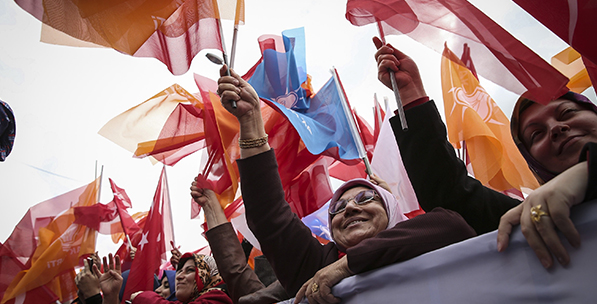Turkey is heading towards new parliamentary elections. In contrast to previous elections, the political parties are conducting a much more low-profile election campaign for the Nov. 1 election. The reason for this is that the Nov. 1 election is a repeat of the June 7 election.
Despite the fact that public opinion surveys demonstrate that there is not a dramatic change in the party choices of voters, no one is able to state anything conclusive about the outcome. It appears that as a result of this election, four parties will once again make it into Parliament. During the June 7 election, the question was whether the Peoples' Democratic Party (HDP) would be able to overcome the 10-percent election threshold and thus whether there would be three or four parties in Parliament. While heading towards the Nov. 1 election, there appears to be a consensus on the fact that the HDP will enter parliament.
On the other hand, the other reason for the lack of conclusions about this election is due to the questions about whether the Justice and Development Party (AK Party) will become the administration by itself or not. In a sense, the upcoming election has become an election about whether the AK Party will gain the votes necessary to become the sole administration or not. This is reflected succinctly in the political discourses of both the AK Party and the three other political parties. While building its political discourse the AK Party talks about the importance of the "single party administration" while the other parties mention "the benefits of coalition." But there is an interesting contradiction that comes to light at this point. The Republican People's Party (CHP), Nationalist Movement Party (MHP), and HDP who talk about a coalition are unable to form one amongst themselves. The main reason for this is the incapability of the radical Turkish nationalist MHP to join with the radical Kurdish nationalist HDP. Accordingly, there must be a scenario where the CHP, MHP, and HDP, who talk about the absolute necessity of a coalition, must form one with the AK Party.
However, be it the CHP, MHP, or HDP, all of them have constructed their political discourse on otherizing the AK Party at every level. The HDP has especially pursued this strategy in a very radical manner. The HDP doesn't just criticize the policies enacted by the AK Party on a micro level, but also evaluates the very presence, political understanding and leadership structure of the AK Party as being extremely problematic. In this sense, it is possible to say that the HDP does not regard the AK Party as a "political rival" but rather as an "enemy" in every sense of the word.
In the aftermath of the Suruç and Ankara massacres, HDP Co-Chair Selahattin Demirtaş insulted the AK Party with labels such as "thief" and "murderer" and accused the party of killing innocent civilians. Demirtaş is slamming the AK Party's Syrian policies and attacking the AK Party through the same political rhetoric used by the radical nationalist MHP, which states that even this policy betrays Turkey.
However, the strange thing is that the HDP also emphasizes that it is preparing for a coalition. The question then becomes what kind of a coalition will the HDP form with the AK Party if the AK Party cannot obtain the majority needed in order for it to establish the administration on its own. The same question is applicable to both the CHP and MHP. At this point, the most consistent political discourse comes from the AK Party. The AK Party speaks about the necessity of becoming the administration by itself in order for Turkey to attain a better management system, for the building of a more stable socio-political structure, and for the continuation of economic growth. If things do not go well and it does not manage to become the administration by itself, then the coalition option becomes possible. Does this mean that the AK Party has a plan A and a plan B?
Unfortunately, no. The AK Party only has a plan A. We cannot say that the AK Party has a plan B. If the AK Party cannot institute plan A, it will then begin choice B. However, this will only be a choice, and not a plan.
But, on the issue of Turkey's management, the CHP, MHP, and HDP have neither a plan A nor a plan B. For all of them, they will only become a partner of the "coalition option" if the AK Party does not come out as the first party. And in this process, there will be no foundational active political element.
In this election, the likelihood of the AK Party becoming the most popular party is quite strong. However, in the case of the AK Party not becoming the administration by itself, the situation will revert to the aftermath of June 7. This means the following: Turkey will once again perform the "coalition or snap election" debate. Unfortunately, by giving rein to the ease of conducting politics based on "being anti-AK Party," the CHP, MHP, and HDP have all been impeded by taking up harsh political discourse against the AK Party, the formation of a "coalition culture," which might be necessary in the aftermath of the Nov. 1 election. For this reason, if the AK Party does not become the administration by itself after the election, no matter what anyone says, another period of turbulence awaits Turkey's politics.
[Daily Sabah, October 30, 2015]








